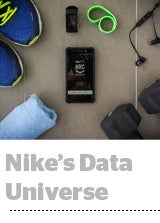 Two years ago, shortly after the start of the coronavirus pandemic, Nike doubled down on what it referred to as its “Consumer Direct Offense,” now more prudently called “Consumer Direct Acceleration.”
Two years ago, shortly after the start of the coronavirus pandemic, Nike doubled down on what it referred to as its “Consumer Direct Offense,” now more prudently called “Consumer Direct Acceleration.”
Nike wasn’t simply weathering a storm, but taking COVID-19’s worldwide shakeup of consumer buying habits as an opportunity to rethink its business “by expanding our digital advantage, reshaping the marketplace of the future and creating deeper, more direct consumer relationships,” CFO Matthew Friend told investors during Nike’s earnings report on Monday.
The company has now united its main ecommerce site, Nike.com, under one data-driven roof along with its direct-to-consumer retail presence and Nike+, its product personalization and loyalty membership program.
But Nike had already started on a major transformation centered on ecommerce and DTC channels.
In 2018, Nike bought Zodiac Metrics, an ad analytics startup out of UPenn Wharton that focuses on customer lifetime valuations. It then acquired Celect, which connects local online demand and inventory fulfillment services. Those two acquisitions became a data science team that was folded into Nike’s overall digital and DTC business.
The following year, in 2019, Nike ditched a first-party seller deal with Amazon. It no longer sells Nike products on Amazon at all – partly because Amazon failed to deliver on a promise to remove fakes and shoddy Nike resellers from the marketplace.
But Amazon also disintermediated Nike from its customers. At the heart of Nike’s business overhaul is its goal of getting as close to customers as possible.
“A more digitally connected Nike is a more valuable Nike,” Friend said. “Increased digital engagement is translating into more repeat buyers, a higher buying frequency and increased average order value, ultimately driving higher lifetime value through membership.”
And Amazon wasn’t the only retail partner scrapped from Nike’s roster. In the past year, Nike stopped selling to DSW, Foot Locker and Urban Outfitters.
Nike didn’t leave all of its retail partners, however. But those that do remain earn their spot by conceding certain rights to customer data. Dick’s Sporting Goods, for example, is now a major strategic Nike wholesaler. Dick’s agreed to a loyalty program partnership with Nike so that customers on the Dick’s site or app who search for or buy Nike products are now trackable by Nike, and can be onboarded directly to Nike+.
“Increasingly, we’re moving beyond inventory to a broader approach of knowing and serving our consumers as Nike members, particularly when shopping through our retail partners,” Friend told investors. “And with clear success thus far in knowing our shared members better, our strategy expanded [last quarter] to serving our shared members one-to-one through connected data.”
Nike wants to be the first-party seller when people shop Nike, no matter where they are. But there’s a big advantage in getting shoppers to its own properties.
Nike’s gross profit margins were down 80 basis points last quarter compared to Q2 2021, Friend said, which doesn’t look great. Considering the mix shift to digital sales, the margins should be higher than wholesale.
The DTC and ecommerce business did, however, improve profit margins by 100 basis points.
The pressure on margins came from the supply chain. The profit margin gains from DTC sales were offset by a 100-basis-point headwind from higher ocean freight costs.
Friend said the costs to ship a single container from China have quintupled since just before the pandemic.
The supply-chain challenges and an economic downturn only make it more important for Nike to focus on DTC sales.
Nike’s marketing this year – which is up 6% from 2021 and expected to grow more this year – will focus on channeling customers to its app ecosystem, since those are the highest-value shoppers for the company.
“We do not take lightly the choice made by consumers to put us in the most prized real estate that exists today: the home screen of their phone,” said Nike President and CEO John Donahoe. “No other brand occupies that space globally like Nike and it remains one of our biggest competitive advantages.”













